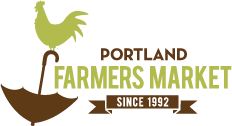By Jana Fay Ragsdale
Ten years ago, when Korean born Chong Choi approached her son Matt about selling her family recipe kimchi to the public she wasn’t thinking of just any public: her goal was to land in the tote bags of PSU Farmers Market customers. “I love the vibrant atmosphere…where there’s an abundance of fresh produce, food, music, and people enjoying life. I’m always inspired by the farmers market and want to share my kimchi with this community that I adore. The farmers market was a perfect place to begin.” Her hunch was spot on, and made good business sense; nine years later with Portland Farmers Market (PFM)’s small business support and Matt’s savvy, Choi’s Kimchi Company has won national awards and is found in retail locations throughout the region.
Sarah and Dirk Marshall’s small batch sauce company is another award-winning PFM small business incubator enterprise. When starting Marshall’s Haute Sauce out of their kitchen over a decade ago she had similar aspirations: “My background is in canning seasonal produce and I wanted to highlight that seasonality. We had built our business around sourcing from local farmers with the idea of being part of the farmers market; we knew it was a requirement, but we also thought it was a great way to connect with our community. We wanted to tell the story of our local farmers, alongside them.”
Specialty products are the fastest-growing segment of the US food business, topping $148.7 billion in 2018. How does someone who makes hot sauce out of their kitchen muscle their way in?
Unlike for-profit brand development and marketing companies that can charge hefty upfront fees and commissions, PFM’s nonprofit model nurtures the development of local businesses and together these small producers along with growers generate a mighty $12 to $15 million in sales annually for our local economy.
It’s a model that excels according to Matt Choi: “A lot of PFM’s communication (including the vendor handbook, orientation, and face-to-face support) really prepared us for a level of professionalism that I think is super important early on. Being ready to go, having all your equipment, being an ambassador for your brand at the market, and knowing what to do is underrated from the perspective of building a brand, but it’s really all that customers will see from you.”
Sarah Marshall points out that the displays, packaging, and pricing are all critical factors in a small business startup. “We attended the new vendor training with PFM, and the staff encouraged a clean clear booth and signage. We took that to heart, and often get compliments on our booth. That was eight years ago and now I train other vendors on booth design at a California-based farmers market conference.”
But these food artisans aren’t just creating a living for themselves; they’re also fostering an economically, environmentally and socially sustainable community.
“Selling at PFM was a huge part of my vision,” says new vendor Amy Colville of aMYLK, nutrient-dense plant-based beverages in soothing pastel hues. “To sell at PFM is highly aspirational; I feel very honored to have this opportunity to present my products.” Amy’s business grew almost 260% last year due to farmers market sales allowing for expansion into other retail opportunities.
She follows Choi and Marshall as well as legacy vendors like Olympia Provisions, Jacobsen’s Salt, Dave’s Killer Bread, Alma Chocolates, and Honey Mamas, who all incubated their businesses at Portland Farmers Market and are now national retail staples.
Often PFM is the first direct-to-consumer sales experience for emerging artisan food vendors, where enthusiastic shoppers are an adventurous impromptu focus group.
Market-goers continually provide input for Haute Sauce recipe development, notes Marshall. “My husband and I work the market booth, rather than employees, so we can hear directly what our shoppers want. Over the years we have had to make our sauces hotter as our regular customers get used to the heat level and want more. We are totally into that!”
When preparing for the big leap into retail, Matt Choi decided to update their packaging. “We chose one of the busiest market days in the summer at PSU and let customers choose from two different labels. We had around 300 votes and the label that they decided on is pretty much the same label we are using nearly 10 years later!”
Colville’s face-to-face interaction helped build her base: “I knew I had a great product, but I wasn’t sure if everyone was ready for it. There is nothing like aMYLK available in the marketplace and being at PFM has been a great way to introduce it to people. They can taste it, tell me their health stories, tell me about their families…I love the old ways. It makes me happier than I can say.”
While this marketing model is both halcyon and innovative, ingredient sourcing and farmer relationships are paramount, and key to the mission of the Portland Farmers Market.
Marshall sources the majority of her ingredients locally at the peak of the season and creates market-only specials that elevate whatever unique produce is captivating her at the moment. Our process is evolving, notes Marshall. “Many of the original farmers we sourced from have retired. We have moved in a new direction of buying from small new organic (often female-owned) farms, and sourcing from many, rather than buying from one big organic farm. I am excited about this new year because I feel like we get to be part of building this new generation of female farmers.”
Enabling each generation of producers to support regional farmers is what makes the PFM business model innovative and so valuable to the local economy. In turn, PFM ensures that its five unique and vibrant markets allow opportunities for growth and expansion for local food producers during every step of their journey.
